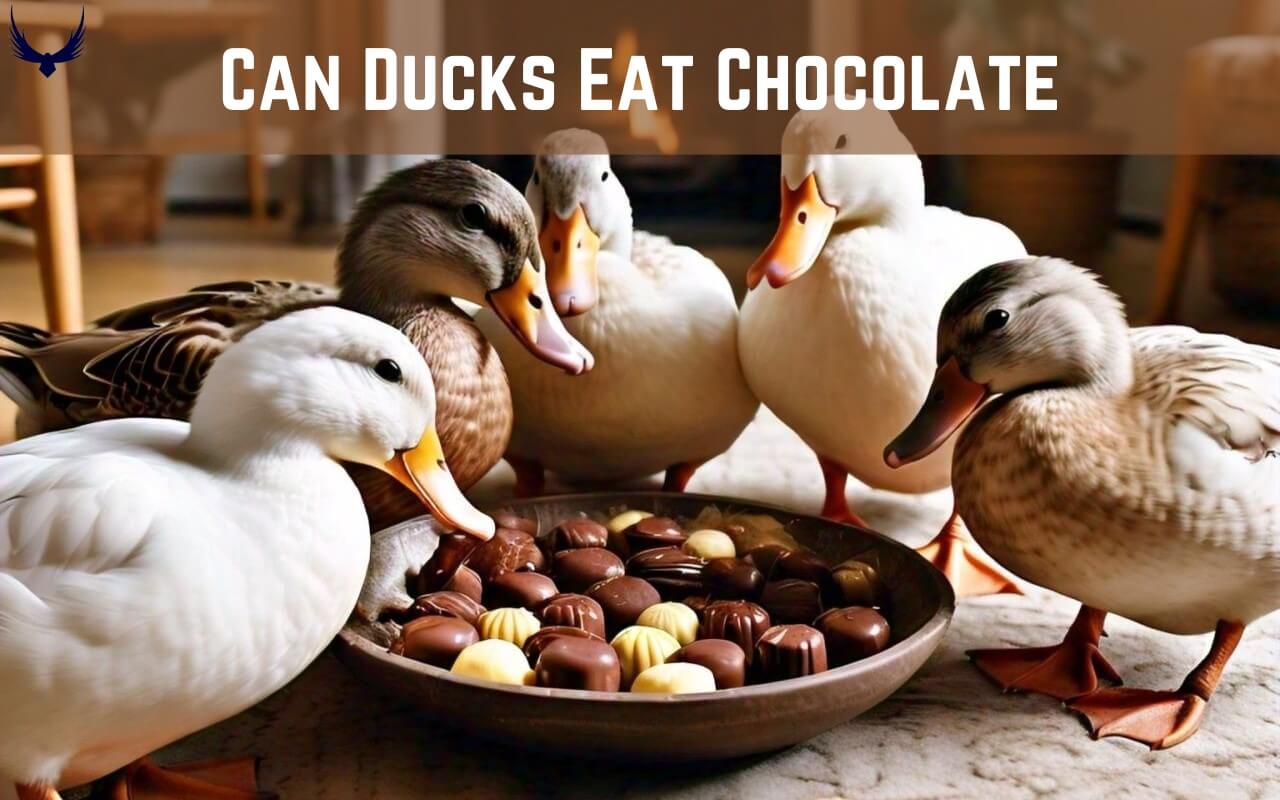Duck owners often give treats as rewards or supplements to ducks. It’s important to research before giving ducks new foods to avoid any health issues. Duck lovers often wonder, do ducks eat chocolate? Chocolate may seem like a tasty treat for ducks, but it can harm their health.
Let’s find out can ducks eat chocolate? and why it’s not safe to feed them chocolate.
Can Ducks Eat Chocolate?
Chocolate is not good for ducks. It has a lot of fat and sugar, which can be harmful to them. Ducks don’t get any nutrition from chocolate like humans do.
Chocolate contains two main ingredients that are toxic to ducks: Theobromine and Caffeine. These substances are Methylxanthines, which are stimulants that can adversely affect the nervous system, cardiovascular system, and digestive system of ducks.
Eating chocolate can make ducks gain weight and have health problems. It’s not safe for ducks to eat chocolate because it has harmful chemicals. Instead of chocolate, ducks should eat foods that are good for them.
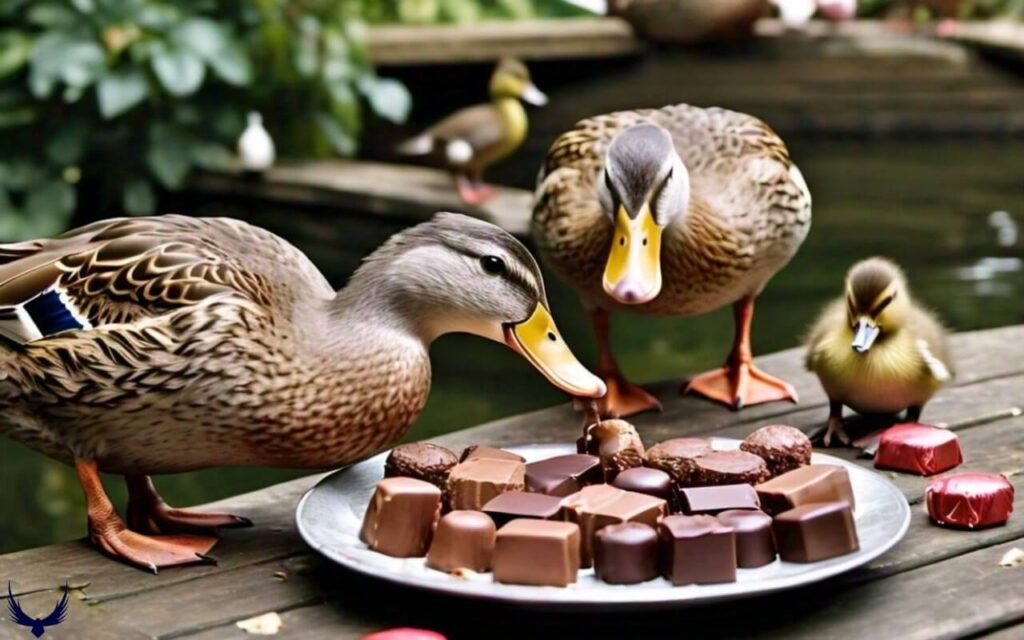
Giving ducks chocolate can make them sick, especially if they eat too much. It’s best to avoid feeding ducks foods that are not good for them, like chocolate. Chocolate can be dangerous for ducks because it has ingredients that can be deadly if they eat too much.
Chocolate is not good for ducks, and it’s better to feed them vegetables and fruits like grapes, strawberries, and bananas instead. It’s important to give ducks a diet that is good for them and avoid feeding them harmful foods like chocolate.
Why Chocolate is Toxic to Ducks?
Here’s why chocolate is harmful to ducks.
Theobromine Toxicity
The main reason chocolate is toxic to ducks is theobromine, a methylxanthine compound found in cocoa beans. Theobromine is a stimulant that affects the nervous system, cardiovascular system, and digestive system of ducks.
Slow Metabolism: Ducks lack the necessary enzymes to metabolize and eliminate theobromine efficiently from their bodies. As a result, theobromine accumulates in their systems, leading to toxic effects.
Nervous System Effects: Theobromine can overstimulate the central nervous system in ducks, causing hyperactivity, restlessness, muscle tremors, seizures, and potentially fatal neurological complications.
Cardiovascular Effects: Theobromine can increase heart rate, blood pressure, and lead to cardiac arrhythmias or heart failure in ducks.
Digestive Effects: Theobromine can cause digestive distress, including vomiting and diarrhea, which can lead to dehydration.
Caffeine Toxicity
Chocolate has caffeine, which is a compound that adds to its toxicity in ducks.
Stimulant Effects: Caffeine is a strong stimulant that further increases the nervous system and cardiovascular effects caused by theobromine, leading to increased heart rate, hyperactivity, and restlessness.
Additive Toxicity: The combined effects of theobromine and caffeine can enhance the overall toxic effects of chocolate in ducks.
Dose Dependent Toxicity
The amount of chocolate required to cause toxicity in ducks varies depending on several factors:
Type of Chocolate: Dark chocolate contains higher concentrations of theobromine and caffeine, making them more toxic than milk chocolate.
Duck’s Size: Smaller ducks are more susceptible to the toxic effects of chocolate due to their lower body weight.
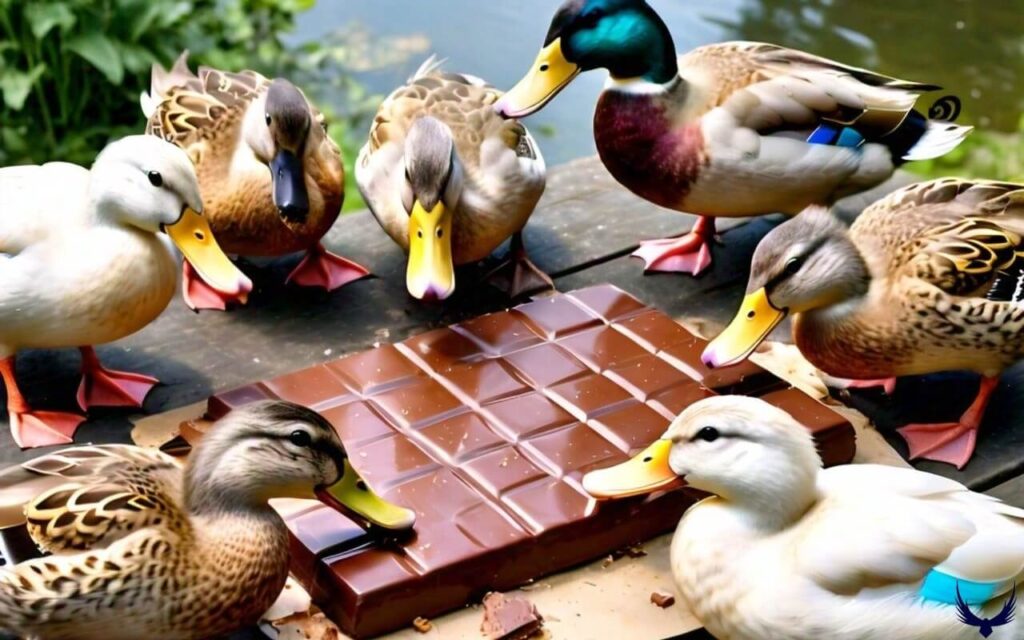
Individual Sensitivity: Some ducks may be more sensitive to the effects of theobromine and caffeine than others.
What Happens When Ducks Eat Chocolate?
When ducks eat chocolate, the consequences can be severe and life threatening. Here is an explanation of the effects of chocolate on ducks.
Absorption and Metabolism
When a duck eats chocolate, toxic compounds like theobromine and caffeine are absorbed into the bloodstream through the digestive system. Ducks lack the necessary enzymes to efficiently metabolize and eliminate these compounds from their bodies.
Nervous System Effects
Theobromine and caffeine are stimulants that can make ducks very active and restless. This can cause muscle tremors and seizures. In severe cases, it can lead to serious neurological problems and even death.
Cardiovascular Effects
Theobromine and caffeine can increase heart rate and blood pressure in ducks. This increased cardiovascular stress can lead to cardiac arrhythmias (irregular heartbeat) and heart failure.
Digestive Effects
The toxic compounds in chocolate can cause digestive infection in ducks, leading to vomiting and diarrhea. Severe vomiting and diarrhea can result in dehydration and electrolyte imbalances.
Symptoms of Chocolate Poisoning in Ducks
Here’s a guide on the symptoms of chocolate poisoning in ducks:
Digestive Symptoms
Vomiting: Ducks may vomit after eating chocolate because their bodies are trying to get rid of toxic substances.
Diarrhea: Chocolate can cause severe diarrhea in ducks, leading to dehydration and electrolyte imbalances.
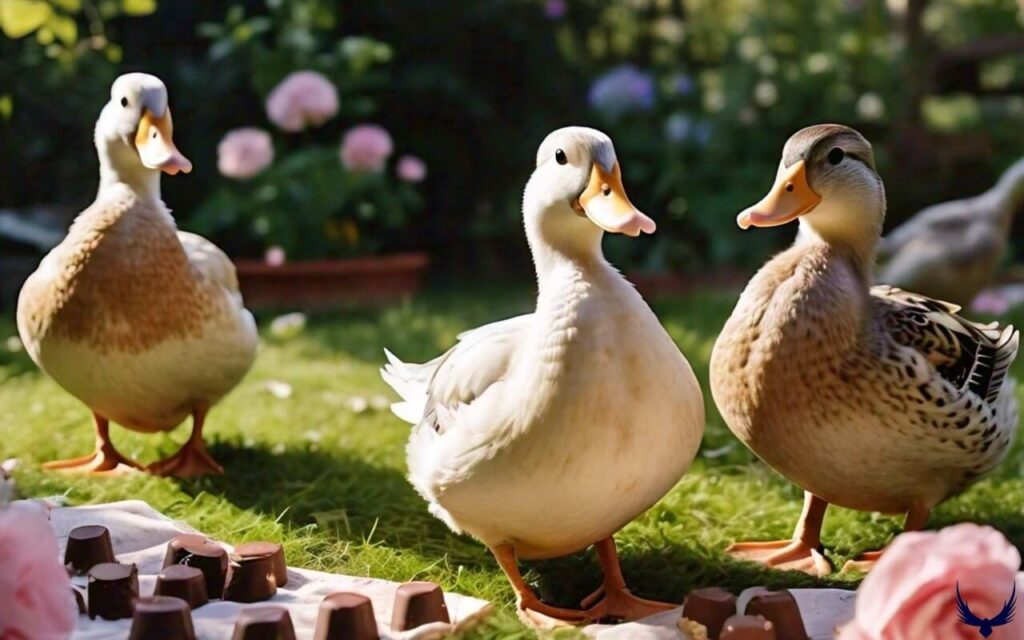
Loss of appetite: Ducks may lose their appetite due to the digestive discomfort caused by chocolate toxicity.
Abdominal pain: Ducks may exhibit signs of abdominal pain or discomfort, such as stretching or swollen abdomen.
Neurological Effects
Hyperactivity and Restlessness: The caffeine and theobromine in chocolate can make ducks hyper and restless by overstimulating their central nervous system.
Muscle Tremors and Seizures: In severe cases, chocolate toxicity can lead to muscle tremors, convulsions, or seizures in ducks.
Disorientation and Incoordination: Ducks may appear disoriented, have difficulty in balancing, or exhibit incoordination due to the neurological effects of chocolate.
Lethargy and depression: Ducks may become lethargic or depressed due to toxic effects on their nervous system.
Cardiac Problems
Increased Heart Rate: Theobromine and caffeine can stimulate the cardiovascular system, leading to an increased heart rate in ducks.
High Blood Pressure: Chocolate toxicity can increase a duck’s blood pressure, putting strain on the cardiovascular system.
Cardiac Arrhythmias: The toxic compounds in chocolate can disrupt the normal activity of the heart, causing irregular heartbeats.
Heart Failure: In severe cases of chocolate poisoning, the strain on the cardiovascular system can lead to heart failure, which can be fatal if left untreated.
Can Ducklings Eat Chocolate?
Ducklings are more sensitive to the toxic substances in chocolate because they are small, and their bodies are not fully developed. Chocolate contains caffeine and theobromine, which can cause digestive issues and malnutrition in young ducks. They cannot metabolize and eliminate harmful compounds in chocolate like adult ducks can.
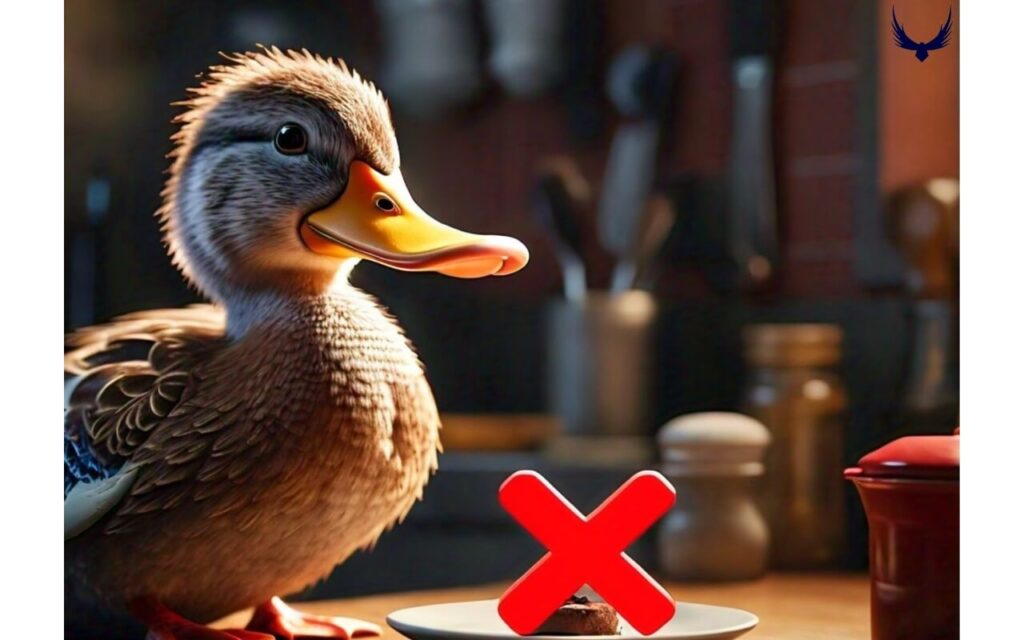
Even a small amount of chocolate can be dangerous for ducklings because of their size and can lead to severe abdominal pain and heart failure in ducklings. It is important to seek medical help from a veterinarian if a duckling eats chocolate, as even a tiny bit can be deadly.
Quick actions, like making the duckling vomit or giving activated charcoal, can help lessen the effects of the toxins. It’s important to keep chocolate away from ducklings to prevent accidents. So, it is crucial to feed them a nutrient-rich diet that supports their growth and health.
Is There a Safe Type of Chocolate for Ducks?
No, there is no safe type of chocolate for ducks. All forms of chocolate including milk chocolate, dark chocolate, and baking chocolate, contain theobromine and caffeine, which are toxic compounds that can be fatal to ducks.
Different types of chocolate have varying levels of theobromine and caffeine, with dark chocolate being the most dangerous. White chocolate has the lowest levels but still carries risks due to sugar and fat content. Milk chocolate falls in between but is not recommended either.
It’s best to avoid giving them chocolate and instead feed them a healthy diet of duck feed, greens, and occasional treats like seeds or vegetables like tomatoes and stick to a natural diet that meets their nutritional needs.
Ducks cannot effectively process theobromine, leading to potential poisoning and health problems. If you want to give ducks a treat, choose items with less cacao seed or no sugar.
Related Post: Can Ducks Eat Watermelon?
Steps to Take if a Duck Eats Chocolate
If a duck consumes chocolate, immediate action is crucial to prevent serious problems. Here are the steps to take:
Contacting a Veterinarian
Seek veterinary assistance immediately if you suspect that a duck has ingested chocolate. Tell the vet what kind and how much chocolate the duck ate, as well as the duck’s size and any symptoms observed. Follow the veterinarian’s instructions promptly.
Inducing Vomiting or Administering Activated Charcoal (if advised by a professional)
The vet may suggest making the duck throw up to get rid of the chocolate before it’s fully absorbed. Giving activated charcoal can help bind to the toxic compounds (theobromine and caffeine) and prevent further absorption. Don’t try to make the duck throw up or give any treatments without guidance from a veterinary, as it can be dangerous.
Providing Care
Provide supportive care to the duck, such as fluids for hydration, warmth, and a quiet environment to minimize stress if advised by the veterinarian. Monitoring the duck’s vital signs, including heart rate, respiratory rate, and temperature, can help assess the severity of the situation.
Follow the veterinarian’s instructions regarding any medications or treatments that may be prescribed to manage the symptoms and support the duck’s recovery.
Prevention is Crucial
Once the immediate situation has been addressed, take steps to prevent future incidents by securely storing all chocolate products and educating others about the dangers of feeding chocolate to ducks.
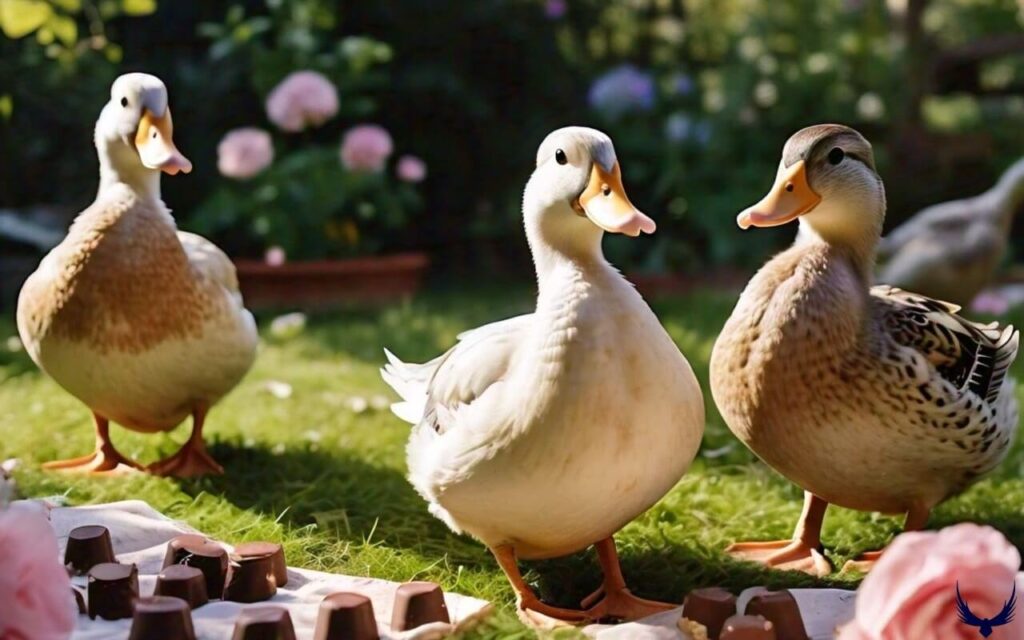
Keep chocolates, baked goods containing chocolate, and any other chocolate-containing items out of reach of ducks and in airtight containers. Inform family members, especially children, about the consequences of feeding chocolate to ducks.
Related Read: Can Ducks Eat Popcorn?
Why is Chocolate Bad for Ducks?
Chocolate is bad for ducks because it contains theobromine and caffeine, which are toxic compounds. Ducks lack the enzymes to metabolize these substances efficiently, leading to their accumulation in the body. Even small amounts of chocolate can cause severe adverse effects.
Chocolate offers no nutritional value to ducks, making its consumption harmful and life-threatening for these waterfowl.
Can Ducks Eat Chocolate Chip Cookies?
No, ducks cannot eat chocolate chip cookies. Even small amounts of chocolate found in chocolate chip cookies can be toxic, especially for smaller ducks or those with higher sensitivities. Ducks need a balanced diet of protein, fat, and carbohydrates. Cookies are high in sugar and can be a choking hazard.
Can Ducks Eat Chocolate Cake?
Ducks should never eat chocolate cake or any other food with chocolate because it is toxic to them. Chocolate has two harmful compounds and ducks cannot break down these compounds well, which can make them sick or even cause death.
Even a small amount of chocolate in a cake can be dangerous to ducks, especially smaller ones or those more sensitive to it. If a duck eats chocolate cake, it may show signs like being overly active, having a fast heart rate, or having diarrhea. In severe cases, it could lead to heart failure or other serious problems.
Some other ingredients in chocolate cake, like raisins, sugar, butter, and artificial additives or certain nuts, can also be harmful to ducks if eaten in large amounts.
FAQs – Can Ducks Eat Chocolate 2024
Can Ducks Drink Chocolate Milk?
No, ducks cannot drink chocolate milk. Chocolate milk contains cocoa, which is derived from chocolate and has theobromine and caffeine – toxic compounds that can be potentially fatal to ducks if ingested.
Can Ducks Eat White Chocolate?
No, ducks cannot eat white chocolate. White chocolate does not contain cocoa solids, it still contains other derivatives from the cocoa bean like cocoa butter, which can potentially be toxic to ducks.
Is Chocolate Bad for Ducks?
Yes, chocolate is extremely bad for ducks. It contains theobromine and caffeine, which are toxic compounds that can accumulate in a duck’s body and cause severe neurological, cardiovascular, and digestive issues.

